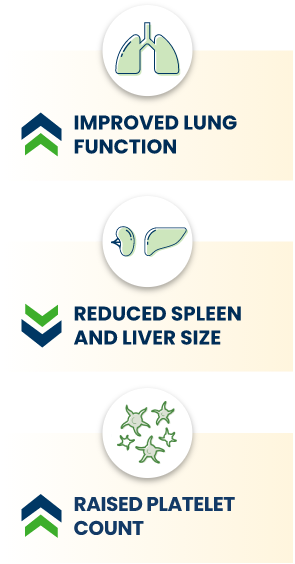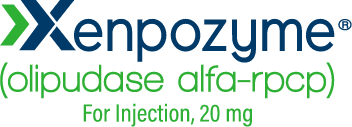
This way forward to proven results in adults
RESULTS IN ADULTS




AFTER 1 YEAR


XENPOZYME significantly improved key symptoms across multiple organs in adults
Clinical trial in adults:
- The safety and effectiveness of XENPOZYME were studied in a clinical trial of 31 adults with ASMD type B or type A/B aged 18 to 66 years.
- 13 adults were randomized to receive XENPOZYME and 18 adults received placebo. The clinical trial was blinded, meaning the participants and their doctors did not know if they were receiving placebo or receiving XENPOZYME.
- All adults were followed for 1 year, after which those receiving placebo were offered XENPOZYME.
- 17 of 18 adults previously receiving placebo and 13 of 13 adults previously treated with XENPOZYME for 1 year started or continued treatment with XENPOZYME, respectively, for up to 4 years.
In adults, XENPOZYME:

After 1 year of treatment, when compared to baseline:

AFTER 2 YEARS


XENPOZYME demonstrated sustained and continuous improvements in multiple organs in adults
Adults in the original XENPOZYME group demonstrated improvements from baseline to 2 years.

SAFETY


The safety of XENPOZYME was studied in a clinical trial in adults
Safety profile in adults

The safety of XENPOZYME was evaluated in the clinical trial over 1 year.
The most frequently reported side effects in adults (incidence ≥10%)

- These are not all the possible side effects of XENPOZYME. Tell your doctor about any side effects that you may experience.
- Hypersensitivity reactions: In the clinical trials, some adults experienced mild or moderate hypersensitivity reactions with XENPOZYME.
- Infusion-associated reactions (IARs): Some adults experienced side effects in the clinical trials that may have been associated with the XENPOZYME infusion. These typically occurred between the time of infusion and up to 24 hours after the infusion was complete.
- During the infusion, the doctor will monitor for IARs. If you or your child is having a reaction to the infusion, whether mild or severe, tell your doctor or infusion nurse right away. The doctor may slow or stop the infusion and may lower the next dose.
In the clinical trials, the majority of IARs with XENPOZYME were mild to moderate
- No one in the clinical trials stopped receiving XENPOZYME due to side effects.
See how XENPOZYME is given.
IMPORTANT SAFETY INFORMATION AND INDICATION
|
WARNING: SEVERE ALLERGIC REACTIONS Allergic Reactions Including Anaphylaxis |
WARNINGS AND PRECAUTIONS
Allergic Reactions (Including Anaphylaxis) and Infusion-Associated Reactions (IARs)
See Boxed WARNING for more information. Your doctor may decide to give you antihistamine, anti-fever, and/or steroid medications before your infusions. Signs of allergic reactions and infusion-associated reactions (IARs) included hives, itchy skin, skin redness, rash, swelling underneath the skin, tender bumps under the skin, and localized swelling, as well as headache, vomiting, nausea, fever, and diarrhea.
Reactions may occur during and/or after the infusion. Tell your healthcare provider right away if you experience any reactions. Your healthcare provider may slow or stop the infusion or may lower the next dose.
Elevated Transaminases Levels
XENPOZYME may be associated with elevated liver enzymes (known as transaminases) within 24 to 48 hours after infusion. Your doctor should check your liver enzyme levels with a blood test:
- within one month before starting XENPOZYME;
- within 72 hours before any infusion during the dose escalation phase, or before your next scheduled XENPOZYME infusion if you missed a dose.
Based on the results of your blood tests, your doctor may make changes to your dose or infusion schedule. Upon reaching the recommended maintenance dose, your doctor may continue to monitor your liver enzyme levels.
Risk to Unborn Babies
Starting or increasing the dose of XENPOZYME is not recommended in a pregnant female as it may cause harm (birth defects) to the developing baby. If you are pregnant or plan to become pregnant, tell your doctor right away.
If you are a female of reproductive potential, your doctor will verify your pregnancy status before you start treatment with XENPOZYME. You should use effective contraception during XENPOZYME treatment and for 14 days after your last dose if XENPOZYME is discontinued.
ADVERSE REACTIONS
- Most frequently reported adverse drug reactions in adults (incidence ≥10%) were headache, cough, diarrhea, low blood pressure, and redness in the eye.
- Most frequently reported adverse drug reactions in pediatric patients (incidence ≥20%) were fever, cough, diarrhea, runny nose, abdominal pain, vomiting, headache, hives, nausea, rash, joint pain, itchy skin, fatigue, and sore throat.
INDICATION
XENPOZYME® (olipudase alfa-rpcp) is indicated for treatment of non–central nervous system manifestations of acid sphingomyelinase deficiency (ASMD) in adult and pediatric patients.
Please see full Prescribing Information, including Boxed WARNING, for complete details.
IMPORTANT SAFETY INFORMATION AND INDICATION
|
WARNING: SEVERE ALLERGIC REACTIONS Allergic Reactions Including Anaphylaxis |
WARNINGS AND PRECAUTIONS
Allergic Reactions (Including Anaphylaxis) and Infusion-Associated Reactions (IARs)
See Boxed WARNING for more information. Your doctor may decide to give you antihistamine, anti-fever, and/or steroid medications before your infusions. Signs of allergic reactions and infusion-associated reactions (IARs) included hives, itchy skin, skin redness, rash, swelling underneath the skin, tender bumps under the skin, and localized swelling, as well as headache, vomiting, nausea, fever, and diarrhea.
Reactions may occur during and/or after the infusion. Tell your healthcare provider right away if you experience any reactions. Your healthcare provider may slow or stop the infusion or may lower the next dose.
Elevated Transaminases Levels
XENPOZYME may be associated with elevated liver enzymes (known as transaminases) within 24 to 48 hours after infusion. Your doctor should check your liver enzyme levels with a blood test:
- within one month before starting XENPOZYME;
- within 72 hours before any infusion during the dose escalation phase, or before your next scheduled XENPOZYME infusion if you missed a dose.
Based on the results of your blood tests, your doctor may make changes to your dose or infusion schedule. Upon reaching the recommended maintenance dose, your doctor may continue to monitor your liver enzyme levels.
Risk to Unborn Babies
Starting or increasing the dose of XENPOZYME is not recommended in a pregnant female as it may cause harm (birth defects) to the developing baby. If you are pregnant or plan to become pregnant, tell your doctor right away.
If you are a female of reproductive potential, your doctor will verify your pregnancy status before you start treatment with XENPOZYME. You should use effective contraception during XENPOZYME treatment and for 14 days after your last dose if XENPOZYME is discontinued.
ADVERSE REACTIONS
- Most frequently reported adverse drug reactions in adults (incidence ≥10%) were headache, cough, diarrhea, low blood pressure, and redness in the eye.
- Most frequently reported adverse drug reactions in pediatric patients (incidence ≥20%) were fever, cough, diarrhea, runny nose, abdominal pain, vomiting, headache, hives, nausea, rash, joint pain, itchy skin, fatigue, and sore throat.
INDICATION
XENPOZYME® (olipudase alfa-rpcp) is indicated for treatment of non–central nervous system manifestations of acid sphingomyelinase deficiency (ASMD) in adult and pediatric patients.
Please see full Prescribing Information, including Boxed WARNING, for complete details.
